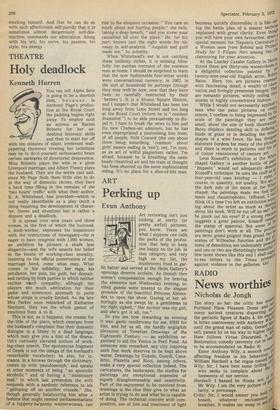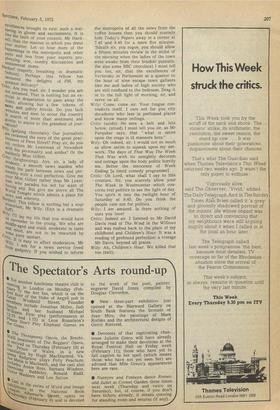RADIO
News worthies
Nicholas de Jongh
ter64 The story so far: the critic has en-seeo Portland Place Pleasure Dome arld a0,1 many ancient creatures disporting "age: the geriatric figure of Radio 4. He e..,010K in bitter controversy with AnthonY noir until the grand man of radio, Gerarjor, sell, passes by on his way to higher wo0t Here follows Virtue Discarded, 3,,rie Restoration comedy (severely cut in to be accommodated on Radio 4). 40,4, Enter Anthony Wily, a smooth cl.'" affecting freedom in his behav11olibe8 William Hardsell a fat rogue turneo 64' Wily: Sir, I have here some trifling"„e rF who seeks to complain about t lurements of our service.
Hardsell: I hazard he thinks not ad” of ff,r Mr Wily. I am the very picture o' larity, a personage. Critic: Sir, I would sooner you he , breath, whatever excitement:, jril breathes. It makes me weep to se' excellences brought to ruin: such a wal l°wing in gloom and excitements, It is less the fault of your content, Mr Hard sell, than the manner in which you dress ,Your matter. Let us hear more of the uaPpenings in the metropolis and other Parts and less from your experts pro PhesYing Woe, sundry discussions and _ sentimental items. rinrdse// (eagerly, breathing fashion): Perhaps this in dramatic savoured the delights fellow has of PM, my c reatest delicacy? of PM, my rttie: Are you mad, sir. I wonder you are not ashamed. That is nothing but an exercise in desperation to pass away the hours, allowing but a few tokens of news and paltry frivols. Do you lack wenches and men to scour the country in search of more than sentiment and gossip to aspire to the grandeur of journalism? Ily (gulping chocolate): Our journalists are reckoned the envy of the great practitioners of Fleet Street? Pray sir, do you not reckon Mr Leastman of Newsdesk With his personality and asides? Or the crini,aidenly Miss Gillett. (brightening): Aye, sir, a lady of rnaciestY, a smooth news maiden who treads the path between news and per sonality with a cool perfection. Give me IYour IVIiss Gillett rather than Mr Least0,11, WIlo parades his wit for want of tiyulg any. But give me above all The „ °rIcl Tonight which admits a place for EictueWs and sobriety. ire4e1/: This fellow is nothing but a sour onoclast, Mr Wily. (Exit in a dramatic liPtiff)1' lay my life that you would have surrender to the young. We who are nuddle-aged and staid, moderate in taste sanci mind, are not to be thwarted by Crit°i Puny upstart. wief It is easy to affect moderation, Mr r„ Y.' I ask for a news service freed -"-'rn gadgetry. If you wished to inform the metropolis of all the news from the coffee houses then you should scarcely hide Today's Papers away in a corner at 7.40 and 8.40 for a mere five minutes. 'Sdeath sir, you rogue, you should allow a fifteen minutes review in the midst of the morning when the ladies of the town were awake from their boudoir pursuits. (he sips some BBC chocolate) 1 must tell you too, sir, that the excellences of Yerterday in Parliament at a quarter to the hour of nine escape town gallants like me and ladies of high society who are still confined to the bedroom. Drag it in to the full light of morning, sir, and serve us all, Wily; Come, come sir. Your tongue contradicts itself. I care not for you city decadents who laze in perfumed places and know many ceilings.
Critic (aside): He sees a belt and hits below. (aloud) I must tell you sir, as Mr Farquhar says, that "what is satire upon the stage is ill manners here."
Wily: Oh indeed, sir. I would not so much as allow satire to squeak upon my network. The days of That Was The Week That Was with its unsightly decorum and outrage upon the body politic horrify me. Better the innocence of Week Ending [a timid comedy programme] Critic: Oh Lord, what shall I say to this creature. Sir, you scarcely allow your The Week in Westminster which concerns real politics to see the light of day. You spirit it into the twilight hour of Saturday at 9.45. Do you think the people care not for politics. Wily: I am amazed. Is there nothing of ours you love?
Critic: Indeed sir. I listened to Mr David Davis read of The Wind in the Willows and was rushed back to the place of my childhood and Children's Hour. It was a reading of profound perfection: a vintage Mr Davis, beyond all praise.
Wily: Ah, Children's Hour. We killed that too (exit).











































 Previous page
Previous page